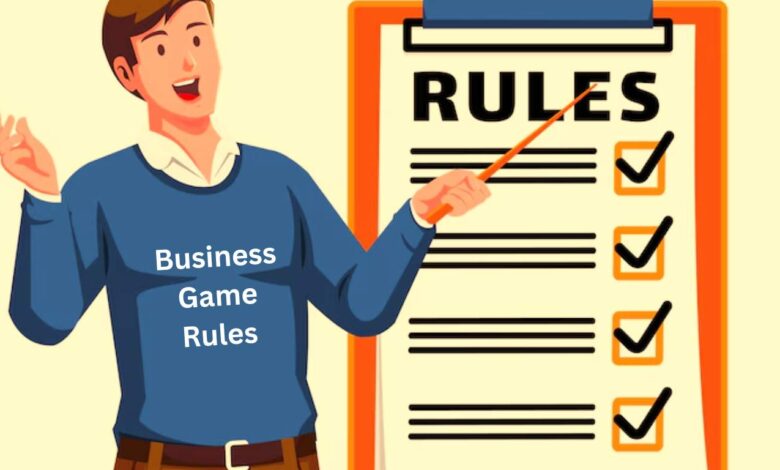Business Game Rules You Need to Know: Tips and Tactics for Success

Business games have long been a staple in helping players understand the fundamentals of strategy, resource management, and decision-making. These games, which simulate real-world business scenarios, offer a fun and competitive environment for learning. Whether you’re playing a classic like Monopoly or diving into newer business board games, understanding the game rules is crucial to mastering these games.
In this post, we will explore the core business game rules, explain how to play popular games like Monopoly, and provide tips for success. Along the way, we’ll also touch on the benefits of playing business games, such as improved financial literacy, negotiation skills, and strategic thinking.
What Are Business Games?
Definition and Purpose
Business games are simulations that aim to mimic real-life business scenarios. These games can range from simple board games to complex digital games. The main purpose of business games is to teach players important business concepts such as money management, negotiation, and strategic decision-making, all in a fun and engaging way.
Importance of Strategy and Decision Making
The essence of business games is strategy. Players must make decisions about how to allocate resources, when to take risks, and how to compete with others. These decisions have direct consequences on the outcome of the game, making it an excellent tool for developing strategic thinking and business acumen.
Types of Business Games: Board Games, Digital Games, and More
Business games can be divided into several categories:
- Board Games: These are traditional, physical games like Monopoly, The Game of Life, and Power Grid that often involve physical pieces such as money, properties, and tokens.
- Digital Games: These include video games or apps like SimCity, RollerCoaster Tycoon, and FarmVille, where players can manage businesses in virtual environments.
- Hybrid Games: Some games mix physical and digital elements, such as Monopoly for mobile, offering interactive digital experiences alongside the classic board game.
Understanding Business Board Game Rules
Overview of Business Game Board Rules
Business board games, like Monopoly, follow specific sets of rules to create a structured game environment. Understanding these rules ensures that the game is fair, balanced, and competitive. In general, the goal of most business board games is to accumulate wealth, manage properties, and outperform other players.
Key Components of Business Game Boards
- Properties: These are the physical spaces or assets that players can purchase, trade, or develop. In games like Monopoly, these are the spaces on the board where players can own, rent, and upgrade properties.
- Money/Assets: Money is the main currency in most business games. Players use money to buy properties, pay rent, and invest in upgrades.
- Player Roles: Each player takes on the role of a business owner. Depending on the game, players may act as individuals or compete in teams.
- Game Setup and Initial Preparations: Before starting the game, players need to set up the board, choose their roles, and distribute resources (money, properties, etc.).
- Game Duration and Winning Conditions: Each business game has its own rules for determining when the game ends. Most games end when one player has accumulated the most wealth or has driven all other players into bankruptcy.
Classic Business Games – Examples and Rules
What Is Monopoly?
Monopoly is perhaps the most famous business board game, and it has become synonymous with business strategy games. The game involves buying, selling, and trading properties while managing money and avoiding bankruptcy.
History of Monopoly
First released in 1935 by Parker Brothers, Monopoly was based on a game designed by Elizabeth Magie called The Landlord’s Game. Monopoly quickly became a global sensation and is one of the most popular board games of all time.
Core Business Board Game Rules for Monopoly
- Game Set-Up: Each player selects a token, and the board is set up with properties, houses, and hotels. Players receive a starting amount of money.
- Turn Structure: Players take turns rolling the dice and moving their token around the board. When they land on a property, they can either buy it or pay rent to the property owner.
- Rent and Income: Players collect rent from opponents who land on their properties. Rent increases when players build houses or hotels on their properties.
- Winning the Game: The game continues until one player bankrupts all others by acquiring all the properties or forcing opponents to owe more than they can pay.
Other Classic Business Games
- The Game of Life: In this game, players simulate a person’s journey through life, making choices about education, career, family, and money management.
- The Estates: A strategy game where players bid for construction contracts and develop properties, trying to maximize profits.
- Power Grid: A game focused on resource management, where players compete to build and operate power plants, supplying electricity to cities.
Comparing Rules Across Popular Business Games
While the core principles of business games—such as resource management and strategic decision-making—remain constant, each game has its own unique rules that shape the experience. For instance, Monopoly revolves around property acquisition, while Power Grid focuses more on the supply of electricity and economic competition.
Business Game Rules That Everyone Must Know
- Game Set-Up
Proper setup is crucial for a smooth game experience. Players must arrange the board, assign roles, and distribute money or resources correctly. A well-organized setup ensures the game is fair and enjoyable for all players. - Banker Selection
In games like Monopoly, a banker is needed to manage the bank, oversee transactions, and handle property deeds. The banker should be neutral and impartial to avoid any conflicts of interest. - Dice Rolls and Randomness
Dice rolls are a common feature in business games, adding an element of chance. Players must interpret the outcomes of dice rolls, which can lead to unexpected financial gains or setbacks. - Moving Around the Business Game Board
Movement is a critical part of most business board games. It dictates the properties a player can purchase and determines how much they can invest in their assets. The way you move on the board can impact your overall strategy. - Collecting Rent and Income
Rent collection is a central rule in property-based business games. As players develop their properties, the income they receive from rent increases. Proper management of assets is key to financial success in these games. - Property Development
Developing properties by building houses or upgrading assets is essential in many business games. Players must carefully consider when to invest in property development to maximize their returns. - Using Chance and Community Chest Cards
Cards like Chance and Community Chest offer unexpected opportunities and challenges, such as financial rewards or penalties. These cards add an element of luck, requiring players to adapt their strategies on the fly. - Go to Jail / Penalties
Many business games, including Monopoly, have penalties that can delay progress, such as going to jail. Understanding the consequences of these penalties helps players adjust their strategies to minimize setbacks. - Winning the Game
The rules for winning vary, but the primary goal in most business games is to accumulate wealth or assets while outsmarting opponents. Winning requires a combination of strategic planning, risk-taking, and resource management.
Benefits of Playing Business Games
Money Management
Business games teach players how to manage money effectively, balance spending and saving, and make decisions that impact their financial future. These skills are crucial in both the game and real life.
Negotiation Skills
Negotiation is a key element of business games. Whether you’re trading properties in Monopoly or negotiating prices in The Estates, these games offer great practice for real-world business negotiations.
Risk Taking
Business games often require players to take calculated risks. Whether it’s investing in property development or making deals with other players, understanding how to assess and manage risk is vital to success.
Strategic Thinking
Successful business game players must think ahead and plan both short-term and long-term strategies. They must anticipate their opponents’ moves and adapt their tactics to maintain an advantage.
Wealth Tax and Other Key Features in Business Game Rules
Understanding Wealth Tax in Business Games
Some business games feature a wealth tax, where players must pay taxes based on their accumulated wealth or properties. This rule encourages players to balance their assets and prevents any one player from becoming too dominant.
How Wealth Tax Impacts Player Strategy
Wealth tax can impact a player’s decision-making by making them reconsider how they allocate their resources. Managing wealth wisely becomes a key part of the strategy in games that feature this rule.
Examples of Taxation in Popular Games
In Monopoly, players pay income taxes, and other games like The Estates may feature taxes that impact property development or investments.
Conclusion
Business games are an entertaining way to develop essential skills such as money management, negotiation, and strategic thinking. By understanding the rules and mechanics of games like Monopoly and others, players can enhance their decision-making abilities, apply critical thinking, and practice real-world business strategies in a risk-free environment. Whether you’re looking to improve your financial literacy or simply enjoy some friendly competition, business games provide a valuable and engaging experience.
Frequently Asked Questions About Business Game Rules
- What Are the Most Common Mistakes Players Make in Business Games?
Common mistakes include poor money management, failure to invest in property development, and not understanding the full impact of Chance or Community Chest cards. - How Can I Learn More About Business Board Game Rules?
You can learn more by reading the official rulebooks or searching for “business game rules book pdf” online. Many popular games offer downloadable PDFs for easy reference. - Is There a Business Game Rules Book PDF Available?
Yes, many business game rulebooks are available online in PDF format. Simply search for the game name followed by “rules book PDF.” - Where Can I Find Free Business Game Rules for Download?
Free rulebooks are often available on official game websites or community forums. You can also find them on websites dedicated to board games, offering free downloads for game instructions.



